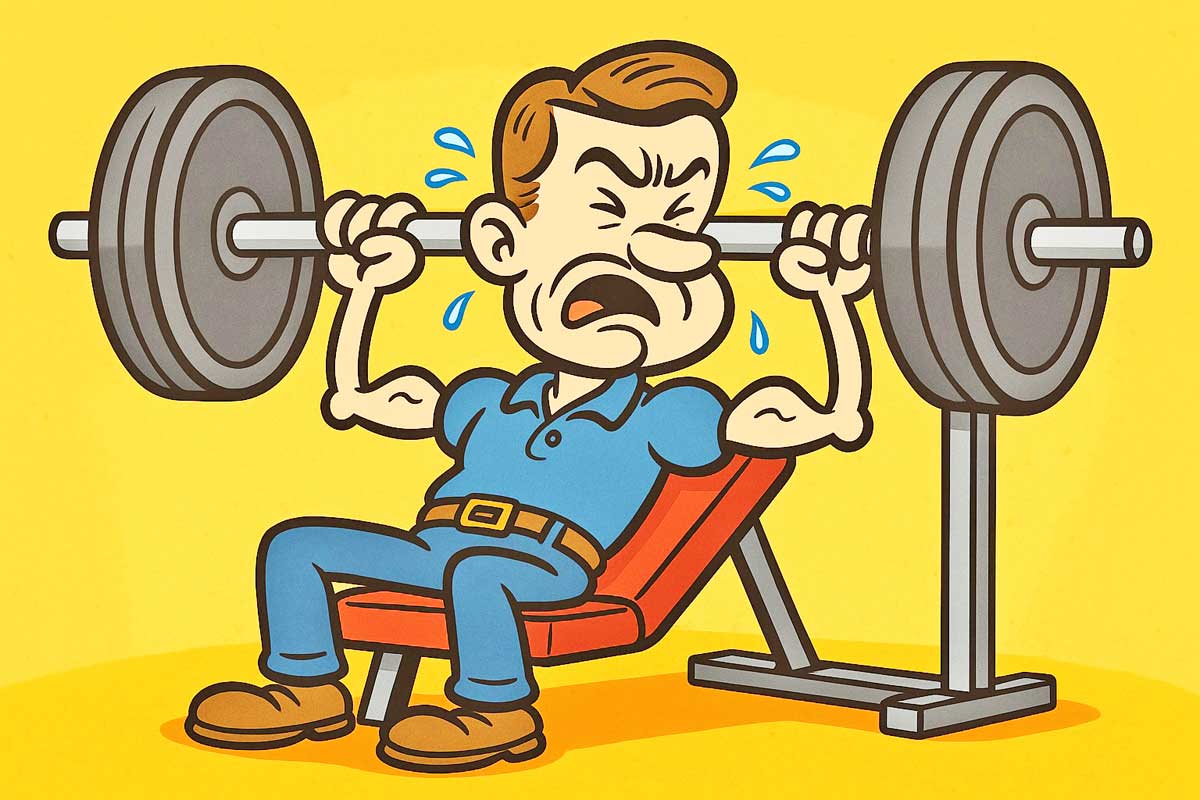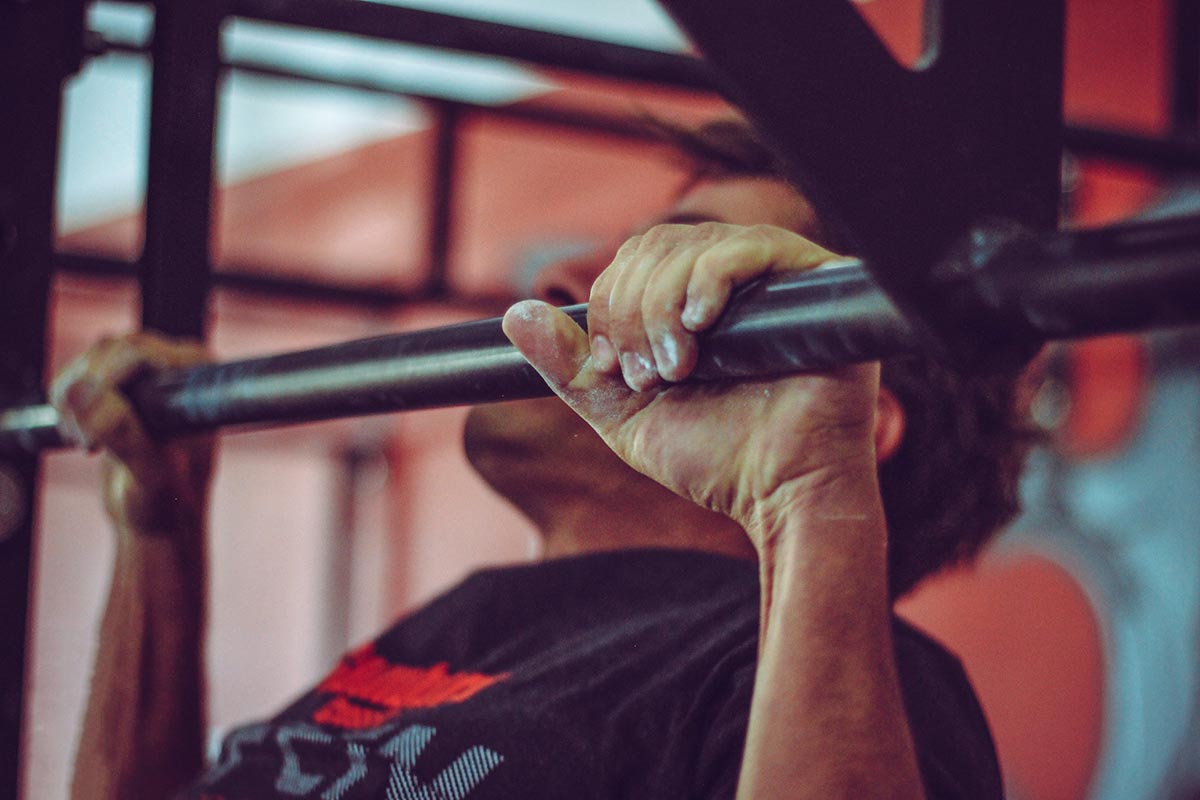The Post That Sparked This
It was 4AM when I scrolled past Charlie Kirk’s latest hit on X—the platform formerly known as Twitter, now a reliable applause chamber for right-wing one-liners, punctured only by the occasional Kroc-style reality check from people who actually lift. In his post, Kirk framed NYC candidate Zohran Mamdani’s viral bench-press moment as proof that Democrats are “losing young men.” The logic was simple and proudly unserious: political competence, judged by a barbell wobble. Somewhere between the rebrand of a social network and the rebrand of masculinity, this became normal.
Right Wing Bench Press Brain Defined
Call it the Right Wing Bench Press Brain: the belief that strength in politics can be demonstrated by performative feats of strength—or, more efficiently, by mocking anyone who struggles with them. It treats the gym like a loyalty oath and makes one’s one-rep max a proxy for virtue. But in actual gym culture, that’s not how respect works. The people who train consistently understand that strength is earned quietly, and that humiliation is a bad spotter.
What Real Gym Culture Actually Values
Walk into any serious gym and you’ll see a code: rack your weights, don’t ego-lift, respect beginners, and help each other get better. The strongest lifters tend to be the quietest ones—the ones who know that today’s new lifter becomes next year’s plate-slapper if you give them time, coaching, and a little dignity. The gym works because it’s an equalizer: a shared struggle against gravity, not a stage for taunts. Turning the bench press into a political purity test breaks that code and cheapens the work.
Mockery Isnt Strength ( Its Insecurity )
Mockery masquerades as strength because it feels powerful in the moment: a quick jab, a cheap laugh, a dunk that gets you likes. But it’s the shortcut of people who can’t show a training log. Real strength requires patience, boredom, failure, and a willingness to look silly while learning a new movement pattern. The easiest way to avoid that vulnerability is to make fun of the person who dares to try. That’s insecurity in gym shorts, not leadership in a suit.
A Word About The Viral Clip
Yes, the clip was awkward. Most first-time lifters look awkward under a bar. A bench press is not a politician’s job description, nor is it a referendum on economic policy, policing, housing, or anything else voters actually live with. Equating a missed rep with moral weakness is rhetorical junk food—tasty, empty, and bad for a healthy civic diet. What matters in a gym is effort and progression; what matters in politics is competence and integrity. There’s no bar path that connects the two.
Why This Rhetoric Backfires With Young Men
The paradox in Kirk’s frame is that it supposedly defends young men while teaching them all the wrong lessons about manhood. If you tell a generation that ridicule is the currency of masculine worth, you don’t build resilient men—you build fragile performers who fear failure because failure now equals shame. Real mentoring is the opposite: coaching through misses, celebrating small gains, and asking better questions than “Did you win the internet today?” The gym is a classroom for that. So is adulthood.
Fitness Is A Journey Not An Identity Badge
Every serious coach will tell you: fitness is a long game. You adjust volume and intensity, you respect recovery, you get humbled by movements you thought you’d mastered. Some people start behind others; some accelerate; some are interrupted by injury, illness, or life. The only meaningful comparison is to your past self. Anyone who lifts for more than five minutes learns that humility is not optional. Turning the barbell into a tribal tattoo isn’t toughness; it’s missing the point.
Leadership Isnt Measured In Plates
We don’t elect mayors to bench our problems. We elect them to analyze tradeoffs, convene coalitions, deploy budgets, and take responsibility when plans collide with reality. If a public figure can do 225 for reps—great. If they can’t—fine. The question is whether they can do the unglamorous work: read the briefings, choose the boring good over the flashy bad, and tell the truth when it’s inconvenient. You can’t max-out your way to sound policy, and you can’t meme your way to safer streets.
Gym Analogies That Actually Make Sense
If you really want to use lifting as metaphor, use the right ones. Progressive overload equals incremental governance: small changes, assessed honestly, compounded over time. Form over weight equals process over spectacle: do it right before you do it heavy. Spot your partner equals look out for constituents who can’t rack the bar on their own. None of this fits into a 15-second dunk clip, which is precisely why dunk clips dominate.
The Seduction Of EgoLifting
Ego lifting looks cool until it doesn’t. Add too much weight and everything compensates: the elbows flare, the back pops, the spotter becomes a savior, and the rep becomes a lie. Politics has its own ego lifting: oversized promises, under-rehearsed details, and the quiet assumption that a friendly media ecosystem will “help the bar up.” That works until gravity reasserts itself—in budgets, in crime stats, in commuter trains that don’t run on time. Then you need real strength—competence, not quips.
How We Got Here (X And The Applause Loop)
The social-media incentive structure rewards humiliation theatre. Shortform platforms pay out in attention, and attention rewards the sharpest edges. That’s why a flubbed bench press becomes a referendum on Western civilization while school lunch contracts get three retweets and a yawn. The new attention economy prefers easy villains and instant schadenfreude. It’s great for building brands; it’s awful for building citizens.
Imagine A Different Viral Moment
Imagine if the clip had ended with a coach stepping in, resetting the grip, adjusting scapular position, teaching leg drive, and the next rep flying up smoothly. Imagine the caption: “Progress beats mockery.” That would be profoundly un-viral and exactly the grown-up thing to share. It demonstrates something politics rarely does: that people improve when you help them, not when you humiliate them. Viral shame teaches retreat; competent coaching teaches persistence.
But Does Mockery Ever Motivate
The tough-love myth says humiliation forges steel. In training, that’s nonsense. Athletes improve under clear goals, specific feedback, and psychological safety—the confidence that failing a rep isn’t a character indictment. Even military programs have long since learned that structured challenge beats random degradation for long-term performance. The mind that believes in public shaming as a training tool is trying to skip the hard work of leadership: building systems where ordinary people can get better.
Young Men Dont Need More Dunks They Need Mentors
If you care about young men, show them how to build a program. Teach them how to read a progression model, how to fuel, how to sleep, and how to be reliable when nobody’s watching. Put them next to peers who model quiet competence and admit when they don’t know something. If your pitch to young men is “join my team and laugh at the small guy,” you’re not offering a path—you’re offering an audience. And audiences are fickle.
The Mamdani Moment Isnt A Referendum On Masculinity
It’s a piece of content. It says nothing reliable about whether the candidate can negotiate with unions, manage a crisis, or pick a police commissioner who can keep both civil liberties and public safety in view. If we want better leaders, we should interrogate their budgets, not their bench. And if we want a healthier culture, we should reward people for attempting hard things in public—even when they wobble.
What Strength Actually Looks Like
Strength looks like patience with yourself and respect for others. It looks like owning your misses and returning to the rack anyway. It looks like gathering accurate data before you tweet, and being willing to update your stance when the numbers change. It looks like praising effort without pretending results don’t matter. None of this is glamorous, which is why it rarely trends. But it’s the only way anything worth having ever gets built—muscle, credibility, or a city worth living in.
| Real Gym Life | Charlie Kirk Logic |
|---|---|
| Bench press = chest strength | Bench press = political IQ test |
| Failing a rep = normal part of training | Failing a rep = why Democrats lose elections |
| Respect beginners, spot their lifts | Mock beginners, post it on X for clout |
| Gym buddy helps you improve | Audience of trolls cheers when you fail |
| Goal: strength & discipline | Goal: own the libs with a shaky bench meme |
Message To Charlie (And Anyone Else Tempted)
If you want to inspire young men, stop telling them that ridicule is a virtue. Show them how to train well and live well. Celebrate the beginner who keeps showing up. Admit that you, too, have days when the bar feels heavier than it should. That’s the human thing, and it’s the only sustainable thing. You can keep chasing viral clips—or you can cultivate real strength. One path pumps your follower count; the other builds people.
And To The Rest Of Us
We can stop feeding the algorithm that turns honest effort into public stockade. We can treat gyms as sanctuaries and politics as serious work. We can hold candidates to standards that matter—competence, honesty, empathy—and let the barbell go back to being a tool instead of a totem. If your politics cannot survive without a punchline at a stranger’s expense, your politics are weak. If your strength requires an audience, it probably isn’t strength.
The Last Rep
Bench presses don’t balance budgets and bicep peaks don’t pave roads. The sooner we stop pretending otherwise, the sooner we can measure leaders by outputs that matter and lifters by the quiet discipline they show at 6AM when nobody is filming. Real strength is humble, useful, repeatable—and it never needs to belittle someone else to prove it exists.













